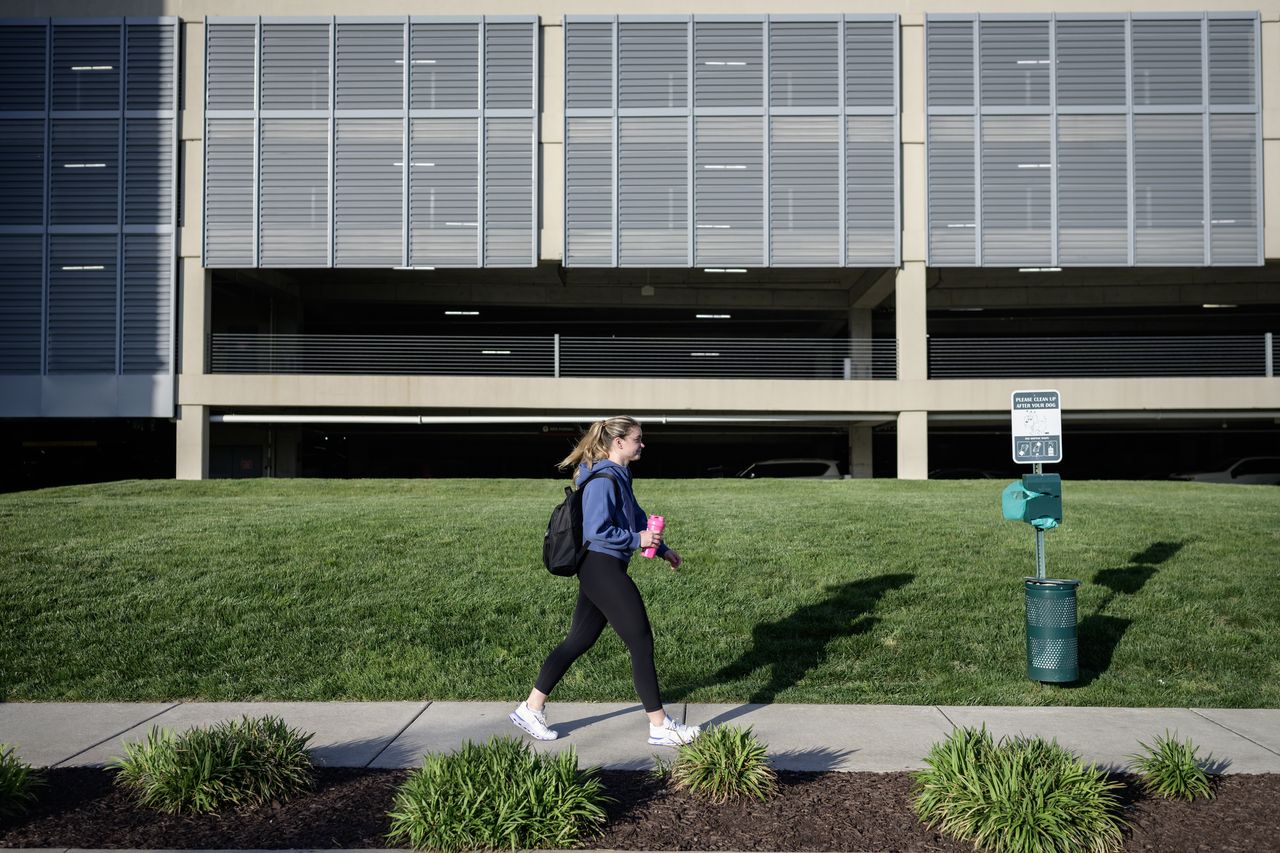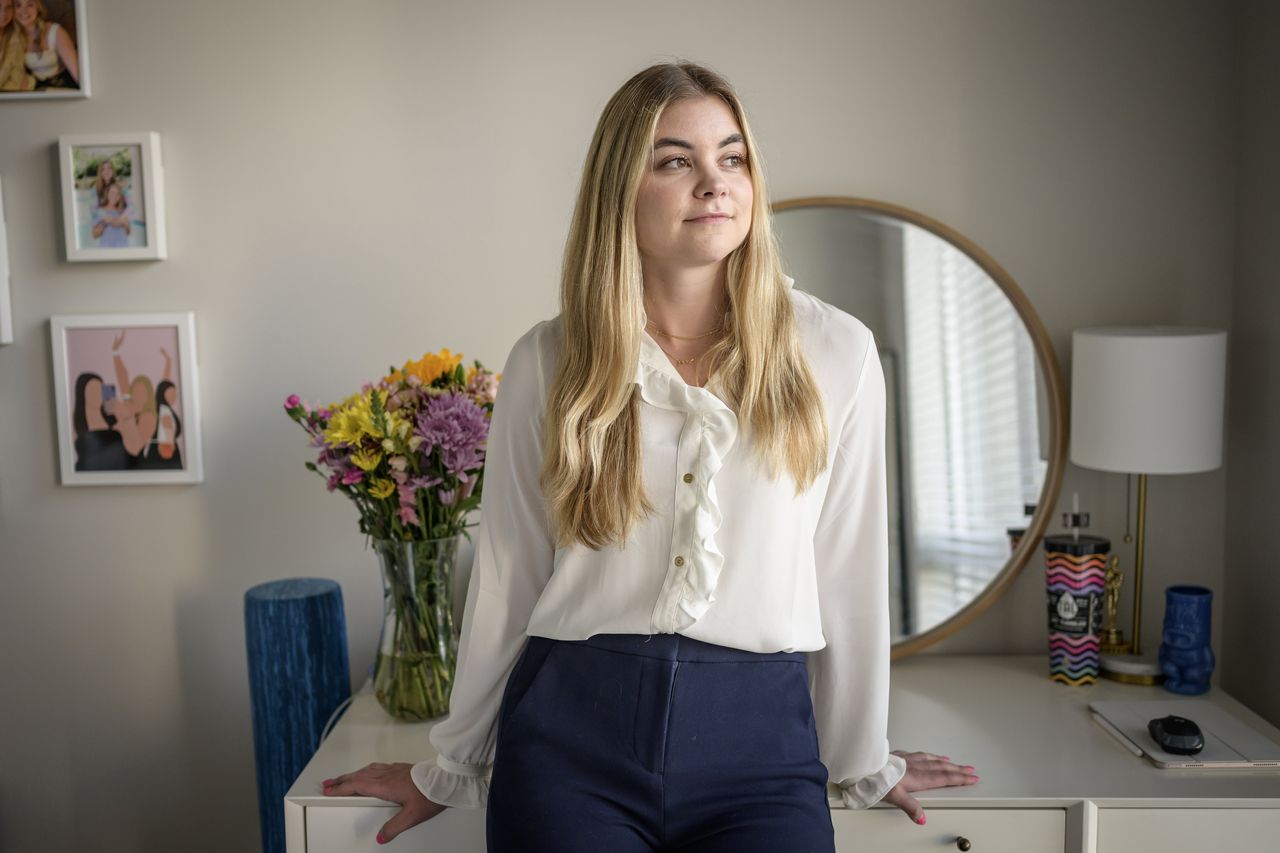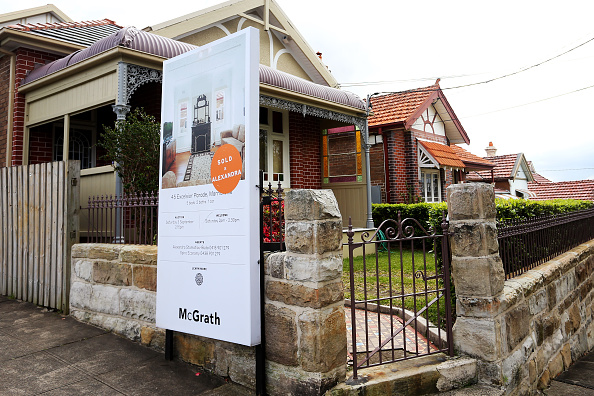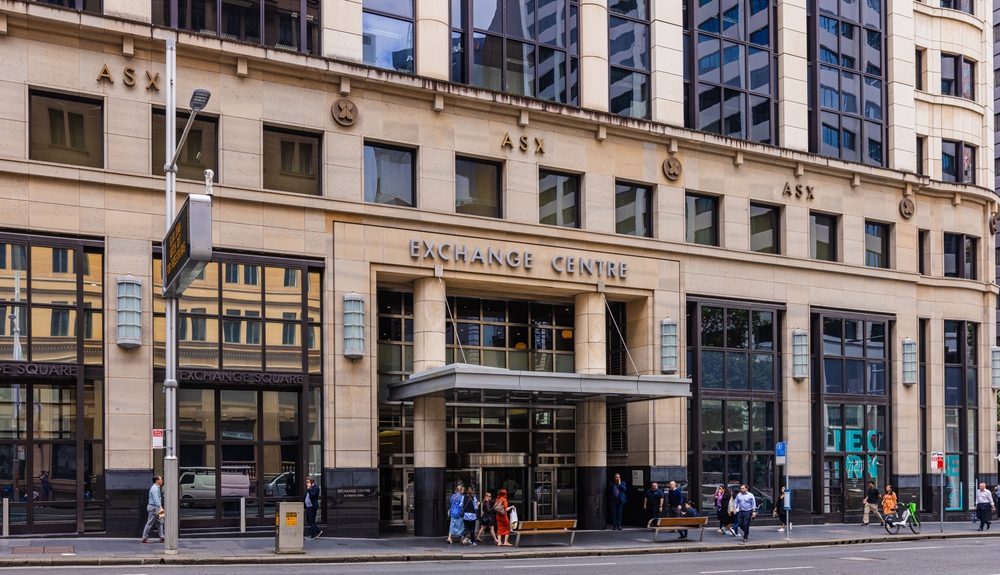How TikTok Is Wiring Gen Z’s Money Brain
Endless videos about the economy and consumerism are giving 20-somethings a case of ‘money dysmorphia’
Americans under 30 get much of their news on TikTok. They hear about money there, too, and that’s shaping the way they save, spend and view their financial prospects, young adults and economists say.
Caitlyn Sprinkle, 27 years old, describes her TikTok feed as a mix of economic gloom and consumerism gone wild. There are Dave Ramsey TikToks that warn of the evils of debt , followed by influencers showing off their shopping hauls of skin-care products and handbags.
Sprinkle, a financial analyst at an asset-management firm in Nashville, Tenn., uses a budgeting app and has been cooking at home lately to save money—and to be able to afford the things she feels she has to buy, like Lululemon leggings. “Between TikTok and having your friends around you, you’re pressured to buy the things because you want to fit in,” she says. “That’s always been the case, but with TikTok it’s more prominent.”
Rallying stocks, rising wages and a tight labor market suggest the economy is stronger than it has been in years. The youngest, lowest-earning professionals don’t feel that way—partly because a large share are carrying consumer debt, and partly because of what they’re seeing on TikTok.
Even as the platform faces a potential ban in the U.S. , it remains a massive cultural force that shapes young adults’ decisions and views. More than half of all U.S. adults ages 18 to 34 use it, according to Pew Research Center, while about a third of those 29 and under say they regularly get news on TikTok , up from less than 10% in 2020.
So, what happens when your main source of news tells you that no one in your generation will be able to buy a house , food prices are spinning out of control and credit-card debt is unavoidable—but also that $2,500 Louis Vuitton bags and $70 moisturisers are, as many videos say, “a must”?
Interviews with finance experts and more than a dozen young adults suggest that the result is confusion, with a side of gloom. Under-30s are taking on debt as they embrace an old idea: If the outlook is bad, why not enjoy life now?
Their own money behaviour
TikTok is creating a disconnect between how well off young adults actually are and how they think they’re doing, according to economists and 20-somethings themselves. That disconnect has given rise to a term financial advisers use to describe young adults’ distorted view of their financial well-being: “money dysmorphia.”
Evelyn Hidalgo, 29, makes her living as a full-time content creator after being laid off from a social-strategist job about a year ago. While she posts about being a mum on a budget, her TikTok feed often shows her trendy items she wishes she had, or a life that seems impossibly far from her own, such as owning a large, beautiful home.
“It doesn’t feel like the norm is your normal,” says Hidalgo, who lives in Nashville with her husband and 20-month-old son. As she looks at the economy on TikTok and other social media, her feed feels “split in half,” between those living an enviable life and those who are struggling.

Gen Z’s mixed economic feelings could have an effect on the outcome of the elections this fall, but the greater impact could be on their long-term financial health, economists say. Feeling financially uncertain can lead to poor choices, such as credit-card debt that eats into retirement funds and necessities such as food and housing, says Jacob Channel, senior economist at LendingTree, an online lending marketplace.
Over the past two years, members of Gen Z—those born between 1997 and 2012—effectively doubled their non mortgage debt, taking on roughly an additional $11,000 on average, according to LendingTree.
Still, younger American adults—those born in the 1990s—saw their median wealth more than quadruple to more than $40,000 between 2019 and 2022, according to the Federal Reserve Bank of St. Louis. That has outpaced the growth rates for previous generations at a similar age, says Lowell Ricketts, a data scientist there.
While many markers of adulthood such as homeownership feel out of reach, young adults are reaping the benefits from the current economic climate, says Monique Morrissey , senior economist at the Economic Policy Institute, a nonprofit economic-research and policy organisation.
“Gen Z and younger millennials are experiencing tailwinds and may not realise that they’re benefiting from a tight labor market that has led to an unusually rapid increase in real wages for younger and lower-wage workers,” she says.
Adding to the confusion is the economy itself. After a string of data showed strength in the labor market, growth is beginning to slow. U.S. employers added a seasonally adjusted 175,000 jobs in April, less than March and below the 240,000 economists anticipated, and unemployment rose to 3.9%, according to the Labor Department.
Keeping up with the Joneses
Many TikTok users say their feeds have become a loop of get-ready-with-me posts, ads, influencer partnerships and videos that encourage them to buy stuff from TikTok’s virtual shop . Some 91% of Gen Zers say they have purchased something they saw on social media, according to a survey from Citizens Pay, a buy-now-pay-later service from Citizens.
BreAunna Rodriguez, a 23-year-old mom of two in Houston, likes to buy TikTok-popular baby clothes and other small things for herself, including eyelash extensions, coconut-oil mouthwash and a pumice stone that influencers said reduces stretch marks.
“It’s hard not to buy things if they say it’s good for me,” she says.
TikTok has influenced bigger decisions, too, she says. Her For You page is filled with young entrepreneurs who snub the idea of a 9-to-5 job. This inspired her to quit her job as an assistant property manager in late 2022 and take a remote, commission-based job for an internet-and-cable company.
“You see a 19-year-old trader on TikTok who only has to work two hours a day, and I was like, ‘How do I do that?’”
Rodriguez says she makes more money now, contributes to a 401(k), pays off her credit card bills each month and puts her annual tax refund into a savings account to help with expenses throughout the year. Her biggest monthly expense is the $2,000 she pays for daycare for her two kids.
The constant videos of consumption—whether it’s a Stanley cup , a Jellycat plush or makeup —are hard to resist. TikTok last year created its own e-commerce engine , TikTok Shop, to compete with online retailers.
About six months ago, Sprinkle bought a Stanley tumbler. “I held out as long as I could,” she says, adding that she had bought several other water bottles that were trending on TikTok.
“There’s an internal pressure among my age range to constantly have these experiences and share them,” says Evan Naar, a 28-year-old lawyer in New York who posts TikToks about Broadway shows he’s seen and a Taylor Swift concert he attended.
Naar, who has several thousand dollars in student debt, says at some point he wants to save more money and buy a house. “A lot of my paycheck goes toward living expenses, travel and Broadway shows,” he says.
OK, doomer
Encountering post after post about the downsides of the economy contributes to “doomerism”—an overwhelming feeling of despair. This has made some young adults thrifty.
“I’m not going to spend my last dollar to keep up with the Joneses,” says Tanayah Thomas, a 23-year-old clothing designer and licensed financial adviser in Staten Island, N.Y. “We have to prepare for what’s to come.”
She’s currently living with her mom to save money.
Tommy Chanthavong, a 27-year-old in Houston who manages social-media accounts for small, local businesses, also moved back home. He says it’s hard to parse the information shown on TikTok: One minute he sees videos saying the U.S. is on the brink of a recession and the next he sees that inflation is easing.
In The Wall Street Journal’s latest quarterly survey of business and academic economists , respondents lowered the chances of a recession within the next year to 29% from 39% in January—the lowest probability since April 2022.
Sprinkle, who shares an apartment with a roommate, says she’d love to own a house one day, but it feels like a distant dream.
“You have to have a level of happiness, and being able to do the things you want and buy the things you want is part of it,” she says. “Do I save all of my money for the future? No. I try to live more in the moment.”
 Copyright 2020, Dow Jones & Company, Inc. All Rights Reserved Worldwide. LEARN MORE
Copyright 2020, Dow Jones & Company, Inc. All Rights Reserved Worldwide. LEARN MORE
This stylish family home combines a classic palette and finishes with a flexible floorplan
Just 55 minutes from Sydney, make this your creative getaway located in the majestic Hawkesbury region.
Continued stagflation and cost of living pressures are causing couples to think twice about starting a family, new data has revealed, with long term impacts expected
Australia is in the midst of a ‘baby recession’ with preliminary estimates showing the number of births in 2023 fell by more than four percent to the lowest level since 2006, according to KPMG. The consultancy firm says this reflects the impact of cost-of-living pressures on the feasibility of younger Australians starting a family.
KPMG estimates that 289,100 babies were born in 2023. This compares to 300,684 babies in 2022 and 309,996 in 2021, according to the Australian Bureau of Statistics (ABS). KPMG urban economist Terry Rawnsley said weak economic growth often leads to a reduced number of births. In 2023, ABS data shows gross domestic product (GDP) fell to 1.5 percent. Despite the population growing by 2.5 percent in 2023, GDP on a per capita basis went into negative territory, down one percent over the 12 months.
“Birth rates provide insight into long-term population growth as well as the current confidence of Australian families,” said Mr Rawnsley. “We haven’t seen such a sharp drop in births in Australia since the period of economic stagflation in the 1970s, which coincided with the initial widespread adoption of the contraceptive pill.”
Mr Rawnsley said many Australian couples delayed starting a family while the pandemic played out in 2020. The number of births fell from 305,832 in 2019 to 294,369 in 2020. Then in 2021, strong employment and vast amounts of stimulus money, along with high household savings due to lockdowns, gave couples better financial means to have a baby. This led to a rebound in births.
However, the re-opening of the global economy in 2022 led to soaring inflation. By the start of 2023, the Australian consumer price index (CPI) had risen to its highest level since 1990 at 7.8 percent per annum. By that stage, the Reserve Bank had already commenced an aggressive rate-hiking strategy to fight inflation and had raised the cash rate every month between May and December 2022.
Five more rate hikes during 2023 put further pressure on couples with mortgages and put the brakes on family formation. “This combination of the pandemic and rapid economic changes explains the spike and subsequent sharp decline in birth rates we have observed over the past four years,” Mr Rawnsley said.
The impact of high costs of living on couples’ decision to have a baby is highlighted in births data for the capital cities. KPMG estimates there were 60,860 births in Sydney in 2023, down 8.6 percent from 2019. There were 56,270 births in Melbourne, down 7.3 percent. In Perth, there were 25,020 births, down 6 percent, while in Brisbane there were 30,250 births, down 4.3 percent. Canberra was the only capital city where there was no fall in the number of births in 2023 compared to 2019.
“CPI growth in Canberra has been slightly subdued compared to that in other major cities, and the economic outlook has remained strong,” Mr Rawnsley said. “This means families have not been hurting as much as those in other capital cities, and in turn, we’ve seen a stabilisation of births in the ACT.”
This stylish family home combines a classic palette and finishes with a flexible floorplan
Just 55 minutes from Sydney, make this your creative getaway located in the majestic Hawkesbury region.






















